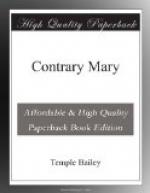“Porter, she’s beautiful. She wears little black frocks with wide white collars and cuffs and looks perfectly adorable. To-night she’s going to wear a black tulle gown and a queer flaring black tulle head-dress, and with her red hair—you won’t be able to drag your eyes from her.”
“I’ve enough red hair of my own,” Porter informed her, “without having to look at Grace’s.”
“I’ll put you opposite her at dinner. Come and see, and be conquered.”
Roger Poole was also invited to the home-coming dinner. Mary had asked nobody’s advice this time. Of late Roger and Barry had been much together, and it was their friendship which Mary had exploited, when Constance, somewhat anxiously, had asked, on the day preceding the dinner, if she thought it was wise to include the lonely dweller in the Tower Rooms.
“He’s really very nice, Constance. And he has been a great help to Barry.”
It was the first time that they had spoken of their brother. And now Constance’s words came with something of an effort. “What of Barry, Mary?”
“He is more of a man, Con. He is trying hard for Leila’s sake.”
“Gordon thinks they really ought not to be engaged.”
The sisters were in Mary’s room, and Mary at her little desk was writing out the dinner list for Susan Jenks. She looked up and laid down her pen. “Then you’ve told Gordon?”
“Yes. And he says that Barry ought to go away.”
“Where?”
“Far enough to give Leila a chance to get over it.”
“Do you think she would ever get over it, Con?”
“Gordon thinks she would.”
Mary’s head went up. “I am not asking what Gordon thinks. What do you think?”
“I think as Gordon does.” Then as Mary made a little impatient gesture, she added, “Gordon is very wise. At first it seemed to me that he was—harsh, in his judgment of Barry. But he knows so much of men—and he says that here, in town, among his old associations—Barry will never be different. And it isn’t fair to Leila.”
Mary knew that it was not fair to Leila. She had always known it. Yet she was stubbornly resentful of the fact that Gordon Richardson should be, as it were, the arbiter of Barry’s destiny.
“Oh, it is all such a muddle, Con,” she said, and put the question aside. “We won’t talk about it just now. There is so much else to say—and it is lovely to have you back, dearest—and you are so lovely.”
Constance was curled up on Mary’s couch, resting after her journey. “I am so happy, Mary. No woman knows anything about it, until she has had it for herself. A man’s strength is so wonderful—and Gordon’s care of me—oh, Mary, if there were only another man in the world for you like Gordon I should be perfectly content.”
It was a fervent gentle echo of Aunt Frances’ demand upon her, and Mary suppressing her raging jealousy of the man who had stolen her sister, asked somewhat wistfully, “Can you talk about me, for a minute, and forget that you have a husband?”




